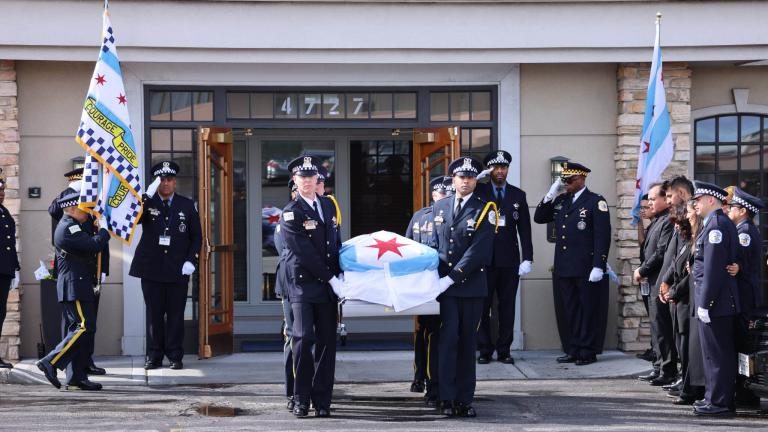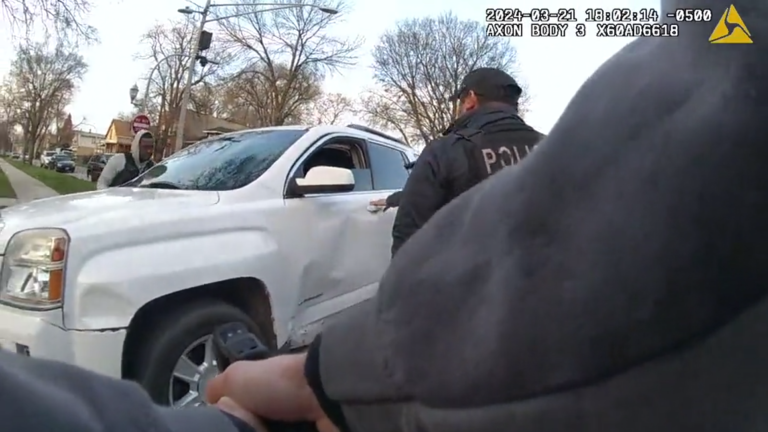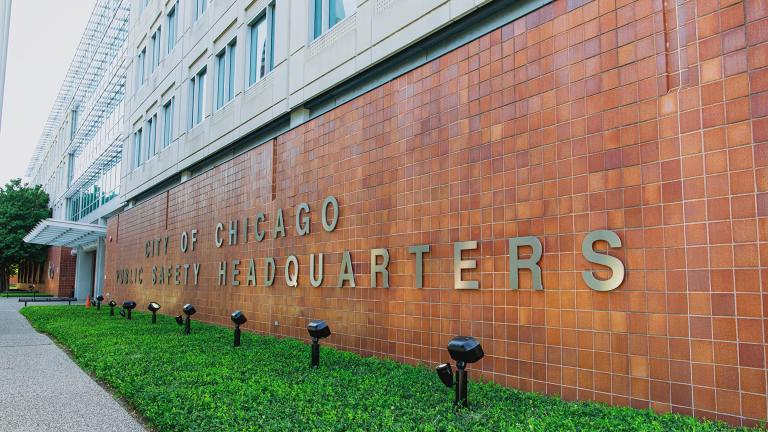Chicago taxpayers paid $91.3 million to resolve lawsuits that named 116 Chicago police officers whose alleged misconduct led more than once to payouts between 2019 and 2021, according to an analysis of city data by WTTW News.
In all, the city spent $197.7 million to resolve lawsuits alleging more than 1,000 Chicago police officers committed a wide range of misconduct — including false arrest and excessive force — in 2019, 2020 and 2021, according WTTW News’ analysis.
Cases that involved at least one officer with repeated claims of misconduct accounted for 47% of the cost borne by taxpayers to resolve police misconduct cases between 2019 and 2021, according to the analysis.
A spokesperson for the Chicago Department of Law, led by Corporation Counsel Mary Richardson Lowry, said the department is in the process of launching a new legal case management system to provide officials with “better data and analysis.” However, that system is not expected to be completed until March 2024.
Lowry’s spokesperson declined to comment on the city’s litigation strategy, but said the office is “committed to working with the Chicago Police Department and the new superintendent, once appointed, to explore effective ways to minimize risk.”
Mayor Brandon Johnson’s office did not respond to requests for comment from WTTW News.
WTTW News’ analysis is the first to examine information published by the Chicago Law Department in annual litigation reports, which are now required by the consent decree, the federal court order designed to compel the Chicago Police Department to change the way it trains, supervises and disciplines officers.
Those reports did not contain the full names of all officers, which were pulled from federal and state case documents and compared against a record of officers’ badge numbers, which sometimes accompany civil suits. In some cases, it was not possible to identify the officers involved.
The reports are “an effort to inform the public about lawsuits against the city involving allegations of civil rights violations or injuries due to a vehicle pursuit involving a CPD officer,” according to the consent decree, which took effect in 2019 after a federal investigation found officers routinely violated the civil rights of Black and Latino Chicagoans.
The $91.3 million the city paid to resolve the cases includes the costs of judgements, including punitive damages, as well as settlements, plus lawyer fees, according to WTTW News analysis.
Two officers were the subject of 10 or more cases that led to payouts between 2019 and 2021: former Officer David Salgado and former Sgt. Xaiver Elizondo. Salgado was named in a total of 12 lawsuits that cost the city $880,000, while Elizondo was named in a total of 10 cases that cost taxpayers $770,000, according to the WTTW News analysis.
Both were found guilty in 2019 on charges of conspiracy and obstructing justice in their roles as tactical officers. Prosecutors alleged Elizondo and Salgado crafted fraudulent search warrants to raid homes and steal cash and drugs. Elizondo was sentenced to more than seven years in prison, while Salgado got a nearly six-year prison term.
Three officers were named in five lawsuits, while four officers were named in four lawsuits that led to a either a settlement or verdict, according to WTTW News’ analysis.
Another 26 officers were named in three lawsuits, including former Chicago Police Detective Reynaldo Guevara, who has been accused of framing more than 50 Chicagoans, including at least one woman who was sentenced to die based on evidence he collected. In 2017, a judge ruled Guevara routinely lied under oath. Guevara, who now lives in Texas, did not leave the Chicago Police Department until 2005.
Cases that named Guevara cost Chicago taxpayers more than $39.3 million in 2019, 2020 and 2021, the most tied to a single officer identified by WTTW News’ analysis.
In all, 32 people who were convicted after being arrested by Guevara were exonerated, according to the National Registry of Exonerations. The city faces at least 12 pending lawsuits filed by those who claim they were wrongfully convicted in cases investigated by Guevara, who often worked with former Detective Edward Mingey. Cases that named Mingey cost taxpayers $38 million, according to WTTW News’ analysis.
Mingey was one of 79 officers to be named in two cases, according to WTTW News’ analysis. Those cases cost taxpayers $38 million, according to WTTW News’ analysis.
In addition, WTTW News identified 23 officers who were named in two cases that cost taxpayers less than $100,000. That means those cases never came before the Chicago City Council, which only reviews proposed settlements of more than $100,000, a key method of oversight.
These new reports are the most comprehensive source about police misconduct lawsuits, and the only official source that links individual officers to specific cases.
However, city officials do not systematically track the number of settled lawsuits or their costs tied to individual officers, making it impossible for police brass to effectively manage the risk posed by the way the Chicago Police Department operates, said Inspector General Deborah Witzburg.
That means none of the Chicago police officers whose conduct cost taxpayers more than $280 million during former Mayor Lori Lightfoot’s administration have been disciplined, retrained or offered counseling in an effort to prevent additional incidents of misconduct.
“There is a roadmap here, but we are not on the road,” Witzburg said.
Witzburg said the cost of resolving police misconduct lawsuits that repeatedly name the same officers takes nearly “$100 million off the top” of efforts to invest in programs to enhance training for officers and help them cope with the trauma that comes as part of their jobs.
In 2022, the inspector general’s office released an audit that implored city officials to change the way they handle police misconduct settlements and ensure officers are held accountable.
But it was not the first time they were warned.
In 2017, the Department of Justice urged city officials to “review settlements and judgments on a broader scale to spot for trends, identify officers most frequently sued, and determine ways to reduce both the cost of the cases and the underlying officer misconduct.”
There is no evidence city officials heeded that warning at any point in the six and a half years since then President Barack Obama’s Department of Justice released its probe of the Chicago Police Department triggered by the police murder of 17-year-old Laquan McDonald in October 2014.
While city officials have yet to release the litigation report detailing payouts in 2022, there is no evidence the problem has been resolved.
In fact, Chicago taxpayers have paid $3.9 million to resolve two cases that named Officer Joseph Lisciandrello and center on conduct that occurred in a three-month period of 2019. Lisciandrello remains on the force, earning approximately $98,000 annually, according to the city’s employee database.
In February 2019, Lisciandrello was one of 12 officers who raided the home of social worker Anjanette Young, handcuffing her while she was naked and ignoring her pleas for help. In her lawsuit against the city, which was resolved for $2.9 million, Young said Lisciandrello pointed his gun at her when she reached for a jacket to cover herself and shouted “let me see your f------ hands.”
Approximately three months after the raid of Young’s apartment, in May 2019, Lisciandrello shot and killed Sharell Brown, 26, after turning off his body-worn camera, according to the investigation of the incident by the Civilian Office of Police Accountability, known as COPA.
Lisciandrello shot and killed Brown after he was stopped by another officer because he fit the “general description” of two men they were looking for in connection with an armed robbery. When officers discovered Brown was armed with a Sig Sauer pistol, he ran from the officers. Approximately 15 minutes later, Brown was dead.
In that case, COPA recommended that Lisciandrello be suspended for a minimum of 180 days or be terminated.
WTTW News’ analysis was prompted by a Washington Post investigation published in March 2022 that used court records to determine that Chicago taxpayers paid more than $380 million to resolve lawsuits naming officers who were subject to more than one paid claim between 2010 and 2020.
The Post’s analysis found Chicago had the highest rate of misconduct claims involving officers named in multiple cases between 2010 and 2020 of any of the big cities it examined, with more than 70% cases resolved during that period involving at least one officer with repeated claims.
Mayor Lori Lightfoot was in office for much of the period examined by WTTW News, during which Chicago taxpayers paid nearly $197.7 million to resolve 341 lawsuits alleging police misconduct.
While in office, Lightfoot vowed to get control of the toll of misconduct settlements but failed to do so. Even though Lightfoot told WTTW News in March 2022 that preventing officers from committing multiple acts of misconduct was a “specific focus of mine,” there is no evidence that Lightfoot made good on promises to create a team of experts from the Law Department and the Police Department to examine allegations of misconduct made in lawsuits to examine the complaint, and determine whether it pointed to a systematic issue that needs to be addressed.
A spokesperson for the former mayor said in a statement she worked diligently to reduce the cost borne by taxpayers to pay settlements and judgments.
“To that end, the Lightfoot administration implemented a range of police reform efforts to mitigate misconduct itself, and the related claims that have cost taxpayers over the course of decades,” according to the statement. “Various facets of the consent Decree seek to prevent repeated incidents of misconduct. The Lightfoot administration worked diligently to implement the consent decree, but, of course, the work continues.”
Early Warning System Failures
The consent decree requires the Chicago Police Department to develop an early warning system to flag officers who were named in lawsuits alleging police misconduct.
“The department hasn’t done it, the city hasn’t done it,” Witzburg said.
Such a system is designed to give police brass a chance to intervene before officers become the subject of multiple complaints or lawsuits by requiring them to undergo additional training or counseling, Witzburg said.
Former Supt. Matt Rodriguez was the first to propose an early warning system for police officers nearly 30 years ago, only to see it blocked by the police union during negotiations over the contract for the Fraternal Order of Police Lodge 7, which dictates the way rank-and-file officers can be disciplined.
In 2014, former Mayor Rahm Emanuel called for a formal early warning system to be put in place after now-former Chicago Police Officer Jason Van Dyke shot 17-year-old Laquan McDonald 16 times in 2014. He left office in 2019 without implementing such a system.
In 2016, the University of Chicago Crime and Education Lab began work on a custom system designed to flag officers showing signs of escalating mental illness or repeated rule violations.
Funded by local philanthropists, including Citadel hedge fund manager Ken Griffin, the so-called Officer Support System was designed not to punish the officers it identified but to flag them for counseling, assistance and retraining if needed. That would not require negotiations with the police union.
In the wake of the unrests and protests triggered by the May 2020 murder of George Floyd by a Minneapolis police officer who had been the subject of multiple complaints, Lightfoot promised to roll out the system within 90 days.
Lightfoot met that self-imposed deadline by launching the system in the Far South Side’s Calumet (5th) Police District as part of a pilot program in September 2020. However, promises to roll out the program citywide in 2021 never materialized. In December 2021, the rules governing the system were revised, but never finalized, according to documents posted online by the Chicago Police Department.
University of Chicago Crime and Education Lab Executive Director Roseanna Ander, who helped craft the system, said the fact that the system was never rolled out citywide was a missed opportunity.
“There is still a clear need for it,” Ander said.
Contact Heather Cherone: @HeatherCherone | (773) 569-1863 | [email protected]








